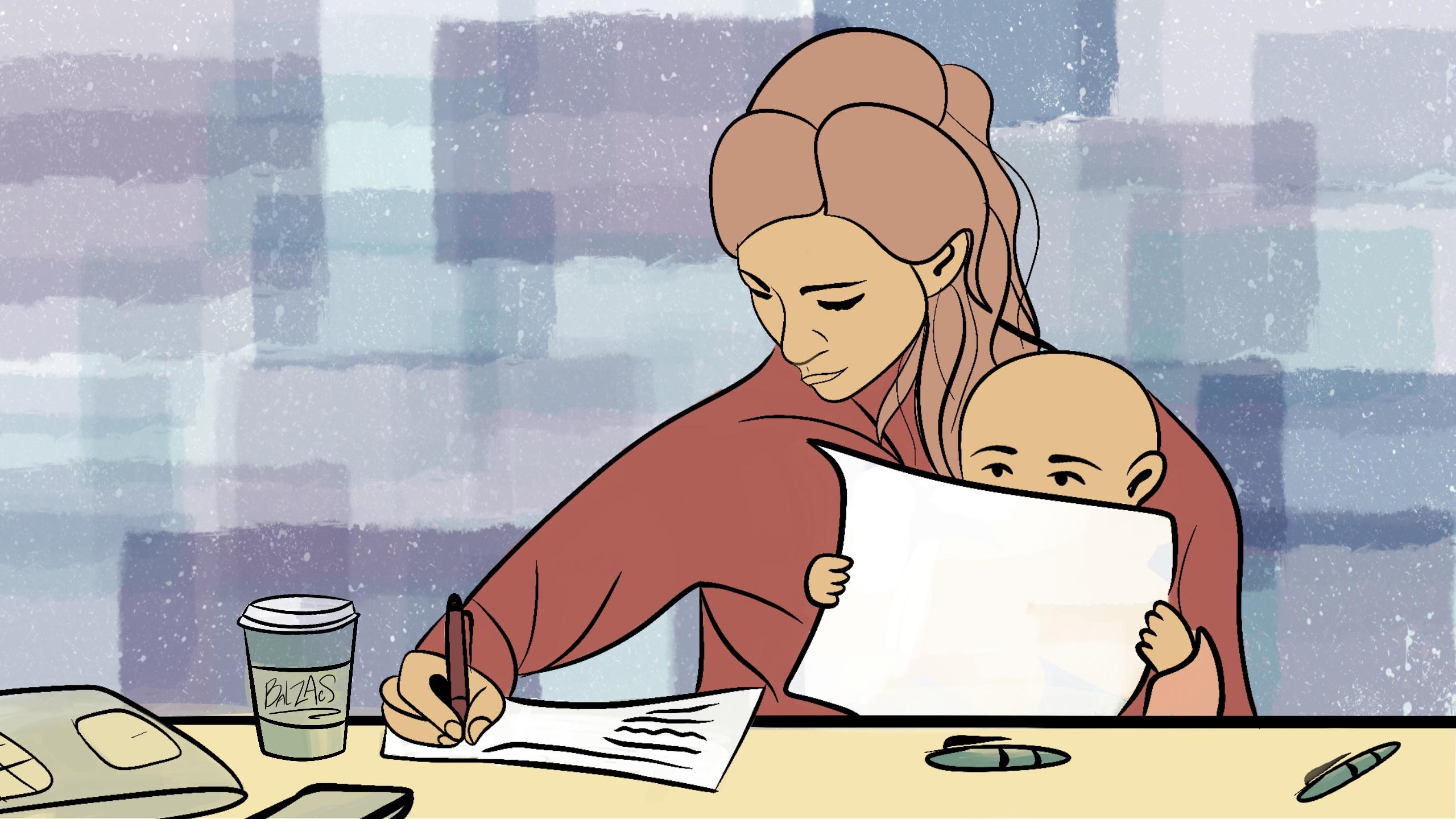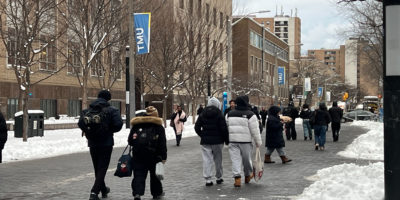By Simone Gavros
Patricia Crockford, a part-time child and youth care student at Ryerson University, usually starts her weekdays at 6:30 a.m. to get a head start on her homework and readings for the day.
The third-year student knows how precious her time is, so as an early bird, she focuses on getting some tasks off her plate before her day really begins, with her main full-time job: parenthood.
Crockford and her husband have five teenage children, four of whom live at home and the other away at college.
Days can get busy in the Crockford household, especially with three of her kids—who are in grades 9, 10 and 11—learning online.
“I also help with reading and writing [at] a Grade 9 level,” she says about supporting one of her children who she says has exceptional needs. “Plus schoolwork, plus working full-time, plus any extra fun stuff that comes with teenagers, including jobs and activities. It has been interesting.”
Some Ryerson students with children experience a delicate balancing act when adding post-secondary education to their plate, along with parenthood and work, which causes many to feel burnt out.
The COVID-19 pandemic has dramatically affected the way parents, children and families function, according to a Statistics Canada report from July 2020. “[Parents with families’] top concern was about balancing child care, schooling and work, with 74 per cent of participants reporting feeling very or extremely concerned in this regard,” the report states.
This stems from increased responsibilities added to their plate, including working from home in some capacity, child care and homeschooling, according to the report.
“Part of that is knowing the reality of how much work as a parent you’re going to have to put in and how you’re going to have to manage it all.”
Crockford found managing synchronous classes last semester challenging while trying to fit her full-time job into a busy schedule.
She says this semester has been much more flexible since she can take asynchronous classes—an option she’s thankful for to limit her exposure to COVID-19, to ensure her immunocompromised family member stays safe. Crockford says she can be there to support her children if they have any questions.
“I chose to go back to school,” Crockford says. “It’s not like I didn’t know I had kids before applying. Part of that is knowing the reality of how much work as a parent you’re going to have to put in and how you’re going to have to manage it all.”
As busy as her days may get, Crockford makes it a priority to allow herself one day of rest on the weekend, which she says isn’t always easy to give herself permission to do.
Support systems, locating resources and diligent planning go a long way, according to parenting coach and author Michelle McVittie.
Any kind of change that disrupts the status quo will not only affect parents but also children, who generally tend to not be a fan of change, even if it’s a positive one that benefits the family household, she says. This goes for any kind of shift, whether it’s a new job or, in this case, school, since people are creatures of habit.
“Mothers are especially hard on themselves and they really just try to do it all,” says McVittie. “To ask for help is a really big step forward and so important because a lot of us tend to not want to lean on people because we don’t want to be a burden.”
Ryerson offers child care support for students with children through the Early Learning and Care Centre operated by the School of Early Childhood Studies.
These services are available for children aged 18 months to four years with priority given to faculty, staff and students, according to Christa Leeder, manager of children and family programs at Ryerson.
The year-round onsite childcare centre currently cares for 47 children. Leeder says the centre still has spaces available and is taking applications from staff and students looking for care.
The daily fees for the program are about $88 for children 15 months to 30 months and about $66 for children 30 months to four years old. However, all spaces available are eligible for childcare subsidies through the City of Toronto.
Ryerson also offers a free drop-in program at EarlyON Child and Family Centres for children up to age six as an opportunity for parents to connect with other community members. This service moved to a virtual platform since the onset of the pandemic.
“[The pandemic] has changed some of those engagement opportunities that we used to have with families, but we’re still finding unique ways to feel connected with them and for them to know how their child’s day is going,” she says.
Although many of these services are for preschool-aged children, Crockford says she wasn’t aware any supports at Ryerson were available to her as a student with teenage children.
“My focus became entirely about how to get my daughter through a pandemic, being socially well-adjusted and emotionally stable.”
Ryerson encourages students to reach out to Student Life and Learning Support for various needs, as well as the Student Care team and Tri-Mentoring services. The Centre for Student Development and Counselling is also an option to support the wellbeing of all students, according to an emailed statement from Ryerson.
Crockford recognizes how fortunate she is to have teenagers who she says are fairly independent and are able to stay on top of their work, as well as to have her husband to lean on.
Lawrence Wiliford had a nearly 20-year career as a professional classical singer, but due to the pandemic, his career was upended and he had to pivot his goals to prepare for what work he would do after the pandemic.
Now, he is both a caregiver and a playmate to his six-year-old daughter, all while being a full-time master’s student in the media production program, which he says has been challenging to balance with his already-full schedule.
“She hasn’t had playdates with kids in two years. [My wife and I] are her entire world. We don’t have any other kids, so that’s exhausting,” he says.
Wiliford chose to go back to school because it would offer him a more flexible schedule to be on standby for whatever his daughter would need when it came to her schooling, versus trying to work.
During the week, he gets most of his schoolwork done when his daughter is at school. Although his grades haven’t suffered, Wiliford says he doesn’t always have the energy to give his A-game on assignments.
Like Crockford, Wiliford had never looked into support for students with children when he started his degree. However, he did reach out to his program supervisors and winter semester professors over concerns about returning to school this semester with a partially-vaccinated child at home.
Although his daughter is fully vaccinated now, she only had one dose at the end of last semester when his return to school was being discussed. Wiliford wasn’t willing to go back in-person with a partially-vaccinated child who has asthma.
His concerns were met with empathy because of his added responsibility of parenthood — a scenario he says many of his professors were also in. Since his return to in-person classes wasn’t expected until the end of February, Wiliford wasn’t as worried as he was before, now that his daughter is fully vaccinated and the country has passed the peak of the Omicron-fuelled wave.
“My focus became entirely about how to get my daughter through a pandemic, being socially well-adjusted and emotionally stable. That’s been my priority,” he says. “Everything else is secondary.”
McVittie says parents should plan out coping strategies and support before times get stressful, whether that’s reaching out to family, friends or a babysitter for support or recognizing what’s not working well in their daily routine and what they need to put in place to improve it.
Reserving time for self-care is also key. “Learning to handle our stress and process our emotions will make us emotionally healthier,” wrote McVittie in her Mom the Manager blog post.
Asking for help is a brave and healthy move, she writes in the blog, and addressing the stress factors will benefit the entire family.
Self-care could look different for any parent, from taking a bath, going to bed on time or just remembering to eat, McVittie says; anything that will help slow down the stressful situations going on.
“Self-care is number one. [Second to that] are your supports, and then planning and kind of making that happen,” she adds.












Leave a Reply